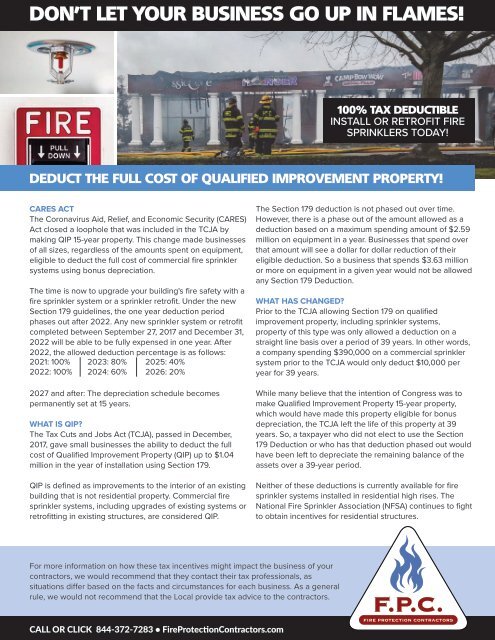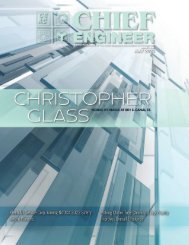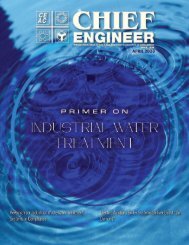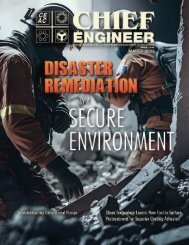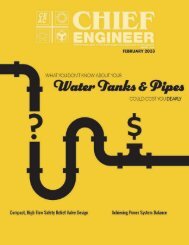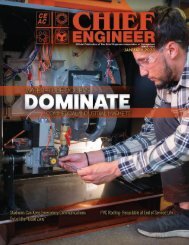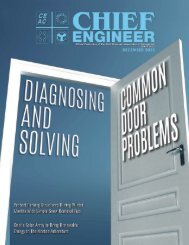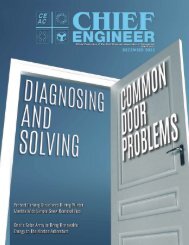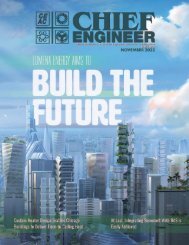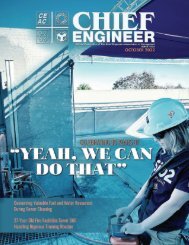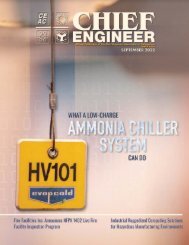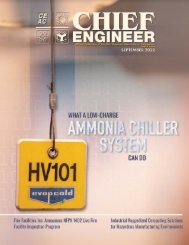CEAC-2021-03-March
Create successful ePaper yourself
Turn your PDF publications into a flip-book with our unique Google optimized e-Paper software.
DON’T LET YOUR BUSINESS GO UP IN FLAMES!<br />
100% TAX DEDUCTIBLE<br />
INSTALL OR RETROFIT FIRE<br />
SPRINKLERS TODAY!<br />
DEDUCT THE FULL COST OF QUALIFIED IMPROVEMENT PROPERTY!<br />
CARES ACT<br />
The Coronavirus Aid, Relief, and Economic Security (CARES)<br />
Act closed a loophole that was included in the TCJA by<br />
making QIP 15-year property. This change made businesses<br />
of all sizes, regardless of the amounts spent on equipment,<br />
eligible to deduct the full cost of commercial fire sprinkler<br />
systems using bonus depreciation.<br />
The time is now to upgrade your building's fire safety with a<br />
fire sprinkler system or a sprinkler retrofit. Under the new<br />
Section 179 guidelines, the one year deduction period<br />
phases out after 2022. Any new sprinkler system or retrofit<br />
completed between September 27, 2017 and December 31,<br />
2022 will be able to be fully expensed in one year. After<br />
2022, the allowed deduction percentage is as follows:<br />
<strong>2021</strong>: 100%<br />
2022: 100%<br />
2023: 80%<br />
2024: 60%<br />
2025: 40%<br />
2026: 20%<br />
2027 and after: The depreciation schedule becomes<br />
permanently set at 15 years.<br />
WHAT IS QIP?<br />
The Tax Cuts and Jobs Act (TCJA), passed in December,<br />
2017, gave small businesses the ability to deduct the full<br />
cost of Qualified Improvement Property (QIP) up to $1.04<br />
million in the year of installation using Section 179.<br />
QIP is defined as improvements to the interior of an existing<br />
building that is not residential property. Commercial fire<br />
sprinkler systems, including upgrades of existing systems or<br />
retrofitting in existing structures, are considered QIP.<br />
The Section 179 deduction is not phased out over time.<br />
However, there is a phase out of the amount allowed as a<br />
deduction based on a maximum spending amount of $2.59<br />
million on equipment in a year. Businesses that spend over<br />
that amount will see a dollar for dollar reduction of their<br />
eligible deduction. So a business that spends $3.63 million<br />
or more on equipment in a given year would not be allowed<br />
any Section 179 Deduction.<br />
WHAT HAS CHANGED?<br />
Prior to the TCJA allowing Section 179 on qualified<br />
improvement property, including sprinkler systems,<br />
property of this type was only allowed a deduction on a<br />
straight line basis over a period of 39 years. In other words,<br />
a company spending $390,000 on a commercial sprinkler<br />
system prior to the TCJA would only deduct $10,000 per<br />
year for 39 years.<br />
While many believe that the intention of Congress was to<br />
make Qualified Improvement Property 15-year property,<br />
which would have made this property eligible for bonus<br />
depreciation, the TCJA left the life of this property at 39<br />
years. So, a taxpayer who did not elect to use the Section<br />
179 Deduction or who has that deduction phased out would<br />
have been left to depreciate the remaining balance of the<br />
assets over a 39-year period.<br />
Neither of these deductions is currently available for fire<br />
sprinkler systems installed in residential high rises. The<br />
National Fire Sprinkler Association (NFSA) continues to fight<br />
to obtain incentives for residential structures.<br />
For more information on how these tax incentives might impact the business of your<br />
contractors, we would recommend that they contact their tax professionals, as<br />
situations differ based on the facts and circumstances for each business. As a general<br />
rule, we would not recommend that the Local provide tax advice to the contractors.<br />
CALL OR CLICK 8443727283 • FireProtectionContractors.com


